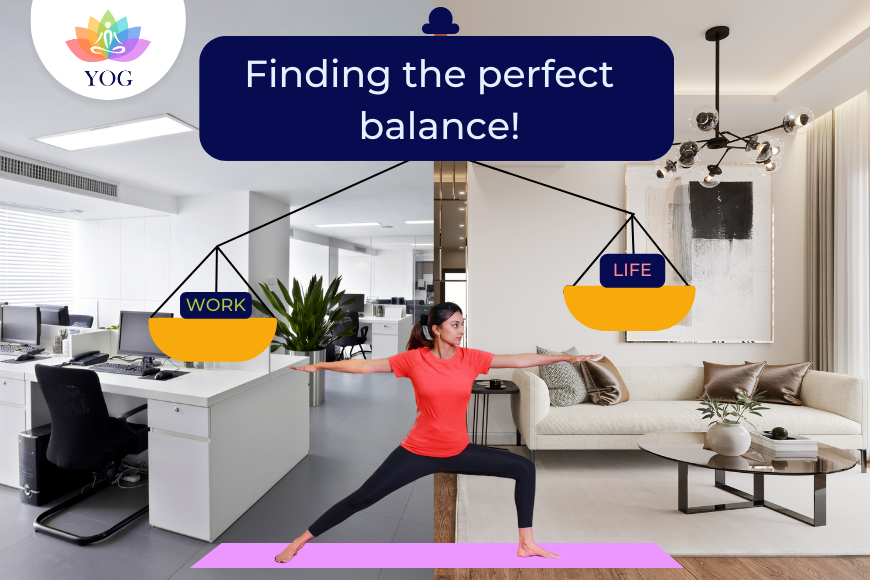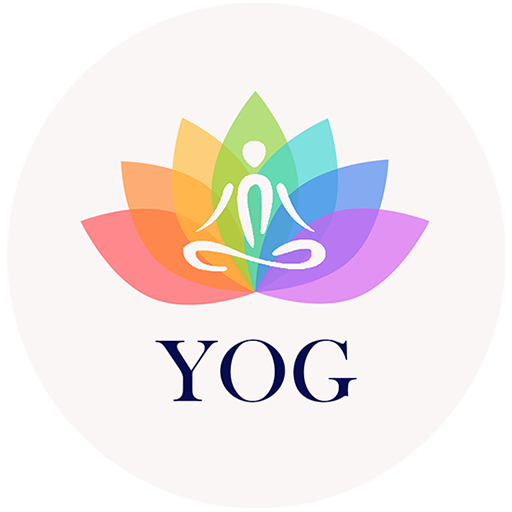In the past five years, the modern-day working culture has undergone a rapid evolution. With the advent of sophisticated technology and increased connectivity, professionals now find themselves juggling an overwhelming number of tasks within a single day. The ability to order groceries while working on a presentation and attending a live seminar simultaneously has become the norm. However, this shift in paradigm has made finding mental balance and prioritizing self-care more crucial than ever before. In this context, yoga can serve as an effective tool for working professionals to find the perfect work-life balance.
- Reducing Stress: One of the primary benefits of practicing yoga is its ability to reduce stress. Yoga incorporates various breathing techniques, meditation and physical postures that promote relaxation and help lower stress levels. In today’s fast-paced work environments, professionals often face high levels of stress, which can have a detrimental impact on their mental and physical well-being. By integrating yoga into their routine, professionals can learn to manage and alleviate stress, leading to improved overall well-being.
- Awakening Mindfulness: Yoga encourages the cultivation of mindfulness, which is the practice of being fully present in the current moment. Through mindful movement, breath awareness and meditation, professionals can enhance their ability to focus and concentrate. This heightened sense of mindfulness enables them to be more present and engaged both in their work and personal lives. By incorporating yoga into their daily routine, professionals can develop a greater sense of awareness and improve their ability to manage distractions and stressors.
- Strengthening the Physical Self: Many office jobs require professionals to spend prolonged periods in sedentary positions, which can lead to physical discomforts such as back pain, neck tension and poor posture. Yoga involves gentle stretching, strengthening and flexibility exercises that can counteract the negative effects of a sedentary lifestyle. Regular practice of yoga postures can alleviate physical discomforts, improve posture and enhance overall physical health. By prioritizing their physical well-being through yoga, professionals can reduce the risk of work-related injuries and improve their overall quality of life.
- Mental Clarity and Productivity: Yoga incorporates various breathing exercises that increase the flow of oxygen to the brain. This increased oxygenation can improve mental clarity, focus and productivity. By practicing yoga, professionals may experience improved cognitive function, enhanced decisiveness and increased creativity, all of which can positively impact their work performance. The ability to approach tasks with a clear and focused mind can lead to greater efficiency and effectiveness in the workplace.
- Work-Life Integration: Yoga promotes a holistic approach to life, emphasizing the integration of physical, mental and emotional well-being. By engaging in regular yoga practice, professionals can cultivate a greater sense of balance and harmony between their work and personal lives. Yoga offers a space for self-reflection, self-care and introspection, allowing professionals to nurture their overall well-being. This holistic approach contributes to improved relationships, increased job satisfaction and a healthier lifestyle overall.
In 2023, professionals should seriously consider incorporating yoga into their lives due to the multitude of benefits it offers. The fast-paced and demanding nature of contemporary work environments requires individuals to take control of their physical and mental health actively. Yoga provides a practical and accessible means for professionals to manage stress effectively and create a sustainable work-life balance. By investing time in yoga practice, professionals can enhance their overall quality of life, foster long-term well-being, increase their resilience and develop better relationships with colleagues and loved ones.
As always, it is advisable for individuals to consult with a healthcare professional or a qualified yoga instructor before embarking on any new exercise program, including yoga, especially if they have any pre-existing medical conditions.
In addition to the benefits mentioned above, there are several other reasons why professionals should consider trying yoga in 2023:
- Emotional Well-being: Yoga not only helps in managing stress but also contributes to emotional well-being. Through regular practice, individuals can develop emotional resilience and learn to navigate challenging situations with greater ease. Yoga promotes self-awareness and emotional intelligence, allowing professionals to better understand and regulate their emotions. This can lead to improved communication, enhanced interpersonal relationships and a more positive work environment.
- Time for Self-Care: Engaging in a consistent yoga practice provides dedicated time for self-care. During demanding work schedules, professionals often neglect their own needs. Yoga offers an opportunity to prioritize self-care and nurture oneself physically, mentally and emotionally. By setting aside time for yoga, professionals can recharge, reduce burnout and cultivate a healthier work-life balance.
- Improved Focus and Concentration: The practice of yoga involves focused attention and concentration. This carries over into other aspects of life, including work. Regular yoga practice can enhance concentration skills, improve memory retention and sharpen cognitive abilities. This increased focus and mental clarity can lead to improved productivity and efficiency in the workplace.
- Better Sleep Quality: Many professionals struggle with sleep issues due to work-related stress and a busy mind. Yoga has been shown to promote better sleep quality by reducing anxiety and helping individuals relax before bedtime. The practice of gentle yoga poses, deep breathing and meditation can create a calming bedtime routine that improves sleep patterns. A well-rested professional is more likely to approach work with a fresh and alert mind.
- Community and Support: Participating in yoga classes or joining a yoga community can provide a sense of belonging and support. Connecting with like-minded individuals who are also striving for work-life balance can be encouraging and inspiring. Yoga classes often offer a space for individuals to share their experiences, challenges and successes, fostering a supportive community that understands the unique pressures of the professional world.
- Resilience in the Face of Change: In today’s rapidly changing work landscape, professionals need to adapt and navigate transitions effectively. Yoga cultivates qualities such as resilience, flexibility and adaptability. By practicing yoga, professionals develop the ability to embrace change with grace and maintain a sense of balance amidst uncertainty. This can lead to increased career satisfaction and a greater ability to overcome challenges.
It is important to note that yoga is not a quick fix or a one-size-fits-all solution. Like any practice, it requires consistency, patience and an open mind. Professionals should find a yoga style and routine that suits their individual needs and preferences. Additionally, seeking guidance from qualified yoga instructors or attending classes can ensure proper alignment and prevent injuries.
In conclusion, in the rapidly evolving world of work, where professionals face increasing demands and pressures, finding the perfect work-life balance has become essential. Yoga offers a holistic approach to well-being, addressing physical, mental and emotional aspects. By incorporating yoga into their lives, professionals can reduce stress, enhance mindfulness, improve physical health, boost productivity, integrate work and personal life and foster emotional well-being. In 2023, professionals should consider trying yoga as a valuable tool for achieving a balanced and fulfilling life in both the professional and personal realms.


